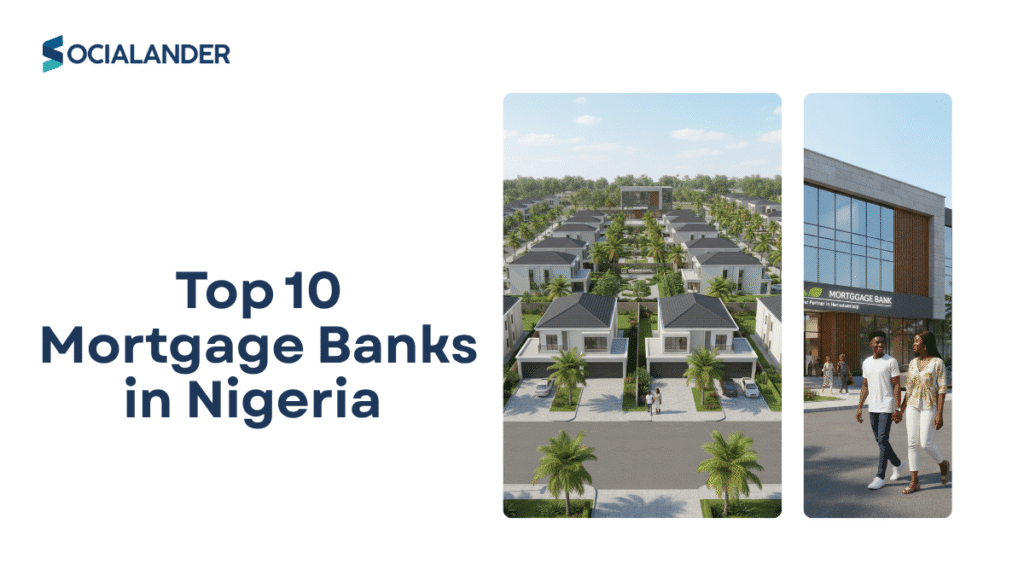
Federal Mortgage Bank of Nigeria (FMBN) was established in 1956, known then as the Nigerian Building Society (NBS), a joint venture of the Commonwealth Development Corporation and the Federal and Eastern Governments of Nigeria. Following the introduction of the Indigenization Policy, the Federal Government, by Indigenization Act [1973], acquired the NBS and consequently renamed it the Federal Mortgage Bank of Nigeria (FMBN).
The top mortgage banks in Nigeria are those licensed by the CBN and accredited by the FMBN, providing robust financing options for homeownership.
We have compiled the definitive list of the top 10 mortgage lenders by scrutinizing their licensing, loan products, and accessibility. By the end of this guide, you will know which banks offer the most competitive NHF rates and the crucial factors to consider so that you can confidently move forward with your home loan application.
1. Federal Mortgage Bank of Nigeria (FMBN)
Federal Mortgage Bank of Nigeria stands as the apex mortgage institution in the country, established by the Federal Government to provide affordable housing finance to Nigerians. In 2024, FMBN approved N71.5 billion in loans, demonstrating its significant role in the housing sector.
Key Features:
- Lowest interest rates in the industry (starting from 6% for NHF contributors)
- National Housing Fund (NHF) loan scheme
- Diaspora mortgage products for Nigerians living abroad
- Rent-to-own programs
- Non-interest housing finance (Islamic mortgage)
Loan Products:
- NHF loans (up to N15 million)
- Estate Development Loans
- Home Renovation Loans
- Cooperative Housing Development Loans
Eligibility Requirements:
- Must be a Nigerian citizen
- Regular NHF contributor for at least 6 months
- Age between 18-60 years
- Proof of stable income
FMBN remains the go-to option for first-time homebuyers and low-to-middle-income earners seeking affordable mortgage solutions.
2. Abbey Mortgage Bank Plc
Established over three decades ago, Abbey Mortgage Bank has built a solid reputation as one of Nigeria’s leading primary mortgage institutions. The bank focuses on connecting aspiring homeowners with flexible financing options.
Key Features:
- Over 30 years of industry experience
- Multiple branch locations across Nigeria
- Competitive interest rates
- Quick loan processing times
- Personalized customer service
Loan Products:
- Home Purchase Loans
- Construction Loans
- Home Improvement Loans
- Equity Contribution Loans
- Cooperative Mortgage Schemes
Why Choose Abbey: Abbey Mortgage Bank offers a balanced combination of experience, reliability, and customer-focused service. Their streamlined application process and responsive customer support make them a preferred choice for many Nigerians.
3. FBN Mortgages Limited
As a subsidiary of First Bank of Nigeria, FBN Mortgages leverages the financial strength and extensive network of one of Nigeria’s oldest banking institutions. This backing provides customers with confidence in the bank’s stability and service delivery.
Key Features:
- Backed by First Bank of Nigeria’s financial strength
- Nationwide branch network
- Advanced digital mortgage platforms
- Flexible repayment options
- Corporate and individual mortgage solutions
Loan Products:
- Residential Mortgages
- Commercial Property Loans
- Developer Finance
- Mortgage Refinancing
- Off-Plan Purchase Loans
Competitive Advantages: FBN Mortgages combines traditional banking reliability with modern mortgage solutions. Their access to First Bank’s infrastructure means faster processing and better customer experience.
4. Infinity Trust Mortgage Bank Plc
Infinity Trust Mortgage Bank has established itself as a customer-centric institution committed to making homeownership accessible to more Nigerians. The bank’s strategic transformation into a public limited company has strengthened its capacity to serve more customers.
Key Features:
- Strong focus on affordable housing
- Innovative mortgage products
- Flexible income verification processes
- Support for informal sector workers
- Real estate development partnerships
Loan Products:
- Rent-to-Own Schemes
- Estate Development Mortgages
- Home Purchase Loans
- Cooperative Housing Loans
- Diaspora Mortgages
What Sets Them Apart: Infinity Trust Mortgage Bank demonstrates flexibility in working with customers from various economic backgrounds, including those in the informal sector who may struggle to meet traditional documentation requirements.
5. Platinum Mortgage Bank
Platinum Mortgage Bank operates as a reliable mortgage provider with a focus on delivering quality housing finance solutions. The bank maintains strong regulatory compliance and offers competitive mortgage products.
Key Features:
- NDIC-supervised and CBN-licensed
- Professional mortgage advisory services
- Transparent fee structure
- Quick approval processes
- Strong partnerships with real estate developers
Loan Products:
- Conventional Home Loans
- Construction Financing
- Home Renovation Loans
- Portfolio Mortgages
- Developer Finance
Customer Benefits: Platinum Mortgage Bank’s transparent approach to fees and charges helps customers understand exactly what they’re paying for, avoiding hidden costs that often frustrate borrowers.
6. SunTrust Mortgage Bank
SunTrust Mortgage Bank has carved a niche for itself by focusing on efficiency and customer satisfaction. The bank uses technology to streamline mortgage processing while maintaining personal customer relationships.
Key Features:
- Technology-driven operations
- Fast loan approval times
- Competitive interest rates
- Excellent customer support
- Real estate advisory services
Loan Products:
- Home Purchase Mortgages
- Construction Loans
- Refinancing Options
- Equity Release Loans
- Commercial Property Finance
Why SunTrust: For customers who value speed and efficiency, SunTrust Mortgage Bank delivers on its promise of quick processing without compromising service quality.
7. Imperial Mortgage Bank
Imperial Mortgage Bank focuses on providing tailored mortgage solutions that meet individual customer needs. The bank’s personalized approach has earned it a loyal customer base.
Key Features:
- Customized mortgage packages
- Flexible qualification criteria
- Dedicated relationship managers
- Strong real estate network
- Competitive pricing
Loan Products:
- Individual Mortgages
- Group Housing Schemes
- Property Development Loans
- Home Improvement Finance
- Mortgage Buyouts
Unique Offerings: Imperial Mortgage Bank’s willingness to work with customers on customized solutions makes it ideal for borrowers with unique circumstances or non-traditional income sources.
8. Mayfresh Mortgage Bank
Operating from multiple locations including Lagos and Aba, Mayfresh Mortgage Bank serves customers across different regions with a focus on accessibility and affordability.
Key Features:
- National operating license (N5 billion minimum capital)
- Multi-location presence
- Affordable housing focus
- Support for small-scale property developers
- Community-based lending approach
Loan Products:
- Residential Mortgages
- Small Developer Loans
- Home Purchase Finance
- Construction Loans
- Cooperative Mortgages
Regional Strength: Mayfresh Mortgage Bank’s presence in both commercial hubs and emerging markets allows them to serve a diverse customer base with varying needs.
9. Jubilee-Life Mortgage Bank
Jubilee-Life Mortgage Bank brings insurance sector expertise into mortgage banking, offering customers additional security and confidence in their housing finance journey.
Key Features:
- Insurance-backed mortgage products
- Comprehensive risk management
- Competitive loan terms
- Professional advisory services
- Strong financial stability
Loan Products:
- Insured Home Loans
- Property Development Finance
- Renovation Mortgages
- Equity Contribution Schemes
- Mortgage Protection Plans
Added Value: The integration of insurance products with mortgage services provides customers with enhanced protection and peace of mind throughout their loan tenure.
10. Haggai Mortgage Bank
Haggai Mortgage Bank rounds out our top 10 with its commitment to ethical banking practices and customer empowerment. The bank focuses on building long-term relationships with borrowers.
Key Features:
- Faith-based ethical standards
- Customer education programs
- Transparent operations
- Flexible repayment structures
- Community development focus
Loan Products:
- Conventional Mortgages
- Cooperative Housing Loans
- Property Development Finance
- Home Improvement Loans
- Refinancing Options
Community Impact: Haggai Mortgage Bank’s emphasis on financial literacy and customer education helps borrowers make informed decisions and manage their mortgages successfully.
Comparison Table: Top 10 Mortgage Banks at a Glance
| Bank Name | Interest Rate Range | Loan Tenure | Minimum Loan Amount | Special Features |
| FMBN | 6% – 9% | 5-30 years | N5 million | NHF loans, Diaspora mortgages |
| Abbey Mortgage Bank | 12% – 18% | 5-25 years | N2 million | 30+ years experience |
| FBN Mortgages | 10% – 16% | 5-25 years | N3 million | First Bank backing |
| Infinity Trust | 11% – 17% | 5-30 years | N2 million | Informal sector support |
| Platinum Mortgage | 12% – 18% | 5-20 years | N2 million | Transparent fees |
| SunTrust | 11% – 16% | 5-25 years | N2.5 million | Fast processing |
| Imperial Mortgage | 12% – 17% | 5-25 years | N2 million | Customized packages |
| Mayfresh | 13% – 18% | 5-20 years | N1.5 million | Regional presence |
| Jubilee-Life | 12% – 17% | 5-25 years | N2 million | Insurance-backed |
| Haggai Mortgage | 13% – 18% | 5-20 years | N2 million | Ethical banking |
Note: Interest rates and terms are subject to change. Always confirm current rates directly with the bank.
How to Choose the Right Mortgage Bank for Your Needs
Selecting the right mortgage bank requires careful consideration of several factors beyond interest rates. Here’s how to make the best choice:
Assess Your Financial Situation: Calculate your monthly income, existing debts, and how much you can comfortably afford as a monthly mortgage payment. Most banks recommend that your mortgage payment shouldn’t exceed 30-35% of your monthly income.
Compare Interest Rates: While interest rates are important, don’t let them be your only consideration. A slightly higher rate with better terms and service might serve you better than the lowest rate with poor customer support.
Evaluate Loan Terms and Flexibility: Look at the loan tenure options, early repayment penalties, grace periods, and flexibility in case of financial difficulties. Some banks offer payment holidays or restructuring options.
Check Documentation Requirements: Different banks have varying documentation requirements. If you’re self-employed or work in the informal sector, choose banks that are flexible with income verification.
Consider Geographic Accessibility: Choose a bank with branches or service points near you. This matters for document submission, queries, and future interactions throughout your loan tenure.
Read Customer Reviews: Research online reviews and speak with existing customers if possible. Their experiences can reveal important information about customer service quality and reliability.
Understand All Costs: Beyond interest rates, factor in processing fees, legal fees, valuation costs, insurance premiums, and administrative charges. Request a complete breakdown of all costs.
Verify Regulatory Status: Ensure your chosen bank is licensed by the CBN and supervised by NDIC. This protects your interests and ensures the bank operates within regulatory guidelines.
Eligibility Requirements for Mortgage Loans in Nigeria
While specific requirements vary by bank, most Nigerian mortgage institutions require the following from loan applicants:
Age Requirements:
- Minimum age: 21-25 years (varies by bank)
- Maximum age at loan maturity: 55-60 years
- Some banks offer extended terms for younger applicants
Income Documentation:
- Salary earners: 3-6 months payslips, employment letter, bank statements
- Self-employed: 2-3 years audited financial statements, tax returns, business registration documents
- Proof of additional income sources if applicable
Credit History:
- Good credit score and clean credit history
- No history of loan defaults or adverse credit reports
- Banks will check your credit report with credit bureaus
Equity Contribution:
- Typically 10-30% of property value as down payment
- NHF contributors may access equity contribution from their RSA
- Higher equity contributions may secure better interest rates
Property Requirements:
- Property must have valid title documents (Certificate of Occupancy, Governor’s Consent)
- Property valuation by bank-approved valuers
- Property insurance (buildings and contents)
- Property must be suitable for residential use
Additional Requirements:
- Valid identification (National ID, International Passport, Driver’s License)
- Utility bills for address verification
- Guarantors or co-applicants (some banks)
- Life insurance coverage
Meeting these requirements increases your chances of mortgage approval, but remember that each bank may have additional specific criteria.
National Housing Fund (NHF) Scheme Explained
The National Housing Fund is a mandatory savings scheme established by the Federal Government to provide affordable housing finance to Nigerian workers. Understanding NHF is crucial because it offers the most affordable mortgage rates in the country.
How NHF Works:
Every employed Nigerian earning N3,000 or more monthly is required to contribute 2.5% of their basic salary to the NHF. This contribution is deducted at source by employers and remitted to the Federal Mortgage Bank of Nigeria.
NHF Loan Benefits:
- Interest rate as low as 6% per annum
- Loan tenure up to 30 years
- Minimal equity contribution (10%)
- Access to loans up to N15 million
- Priority allocation to contributors
Eligibility for NHF Loans:
- Must have contributed to NHF for at least 6 consecutive months
- Age between 18-60 years
- Must be employed or have verifiable income
- Must not have benefited from NHF loan in the past 5 years
How to Apply for NHF Loans:
- Verify your NHF contributions through FMBN
- Identify a property or developer approved by FMBN
- Submit loan application with required documents
- Complete property valuation
- Await loan approval and disbursement
The NHF scheme represents the most affordable path to homeownership for Nigerian workers, offering significantly lower interest rates than conventional mortgage products.
Outro & Summary
We have established that securing your home loan in Nigeria relies on selecting a fully licensed and FMBN-accredited Primary Mortgage Bank. We strongly recommend that you pursue the National Housing Fund (NHF) scheme through one of the national PMBs listed above to leverage the highly subsidized 6% interest rate over a 30-year tenor. It is also important to establish that commercial banks in Nigeria offer mortgage services too.
Frequently Asked Questions (FAQs)
What is the maximum loan tenure for mortgages in Nigeria?
Most Nigerian mortgage banks offer loan tenures ranging from 5 to 30 years. The Federal Mortgage Bank of Nigeria provides the longest tenure (up to 30 years) for NHF contributors, while some primary mortgage banks limit tenures to 20-25 years. Your age at loan maturity typically determines the maximum tenure you can access.
Can foreigners get mortgages in Nigeria?
Generally, mortgage loans in Nigeria are reserved for Nigerian citizens. However, Nigerians in the diaspora can access specialized diaspora mortgage products offered by institutions like FMBN. Foreigners with Nigerian residency permits and verifiable income may apply through certain banks, but eligibility requirements are more stringent.
How much equity contribution do I need?
Most mortgage banks require 10-30% of the property value as equity contribution. NHF loans typically require only 10%, while conventional mortgages may demand 20-30%. The exact percentage depends on the bank, loan amount, and your financial profile. Higher equity contributions often result in better interest rates.
What happens if I can’t pay my mortgage?
If you miss payments, the bank will typically contact you to understand the situation and may offer restructuring options. Continued default can lead to foreclosure, where the bank sells the property to recover the loan. It’s crucial to communicate with your bank immediately if you face financial difficulties rather than simply stopping payments.
Can I refinance my existing mortgage?
Yes, several Nigerian mortgage banks offer refinancing options. Refinancing can help you secure lower interest rates, extend your loan tenure to reduce monthly payments, or switch from one bank to another with better terms. However, refinancing comes with costs including processing fees, legal fees, and early redemption penalties from your current lender.
How long does mortgage approval take?
Mortgage approval typically takes 4-12 weeks in Nigeria, depending on the bank’s efficiency, completeness of your documentation, and property verification requirements. FMBN’s NHF loans may take longer due to high application volumes, while some private mortgage banks offer faster processing for qualified applicants.
Do I need life insurance for a mortgage?
Yes, most Nigerian mortgage banks require borrowers to obtain life insurance coverage for the loan amount. This protects the bank and your family in case of death before the mortgage is fully repaid. The insurance premium is typically paid annually and may be added to your loan costs.





